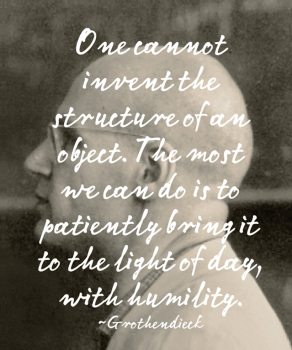Not fresh off the press but interesting nevertheless, this article is by Kaja Perina in Psychology Today:
 The tiny village of Lasserre is tucked into one of France’s southernmost hills, a hamlet of stone buildings strong in the embrace of centuries-old cement. The home in which the mathematician Alexander Grothendieck spent the last two decades of his life in near-complete seclusion is as tranquil as its neighbors. A patchwork of vines—trained, then abandoned—climb toward the white shutters and terracotta roof. Among the few postwar sentries is a standard-issue metal mailbox. Visitors left mostly unclaimed notes for him; letters via post were marked retour a l’envoyeur. The locals knew to leave him alone, but when a young mathematician arrived in the early 1990s in hopes of speaking to him, he slammed the door in her face, screaming.
The tiny village of Lasserre is tucked into one of France’s southernmost hills, a hamlet of stone buildings strong in the embrace of centuries-old cement. The home in which the mathematician Alexander Grothendieck spent the last two decades of his life in near-complete seclusion is as tranquil as its neighbors. A patchwork of vines—trained, then abandoned—climb toward the white shutters and terracotta roof. Among the few postwar sentries is a standard-issue metal mailbox. Visitors left mostly unclaimed notes for him; letters via post were marked retour a l’envoyeur. The locals knew to leave him alone, but when a young mathematician arrived in the early 1990s in hopes of speaking to him, he slammed the door in her face, screaming.
Grothendieck burned many of his papers in 1991, just before moving to Lasserre, though tens of thousands of unpublished pages remain. For years before his death in 2014, at age 86, he could be seen through a ground-floor window, writing long into the night. The pages revealed an obsession with environmental apocalypse. He was said to rave to locals about God and the devil and to have renounced all his mathematical work. This remains hard to accept for many who knew him. To them, he was the greatest mathematician of the 20th century.
Alexander Grothendieck altered mathematics with a velocity that is hard to articulate, so abstruse is his work.
More here. [Thanks to Pramathanath Sastry.]
